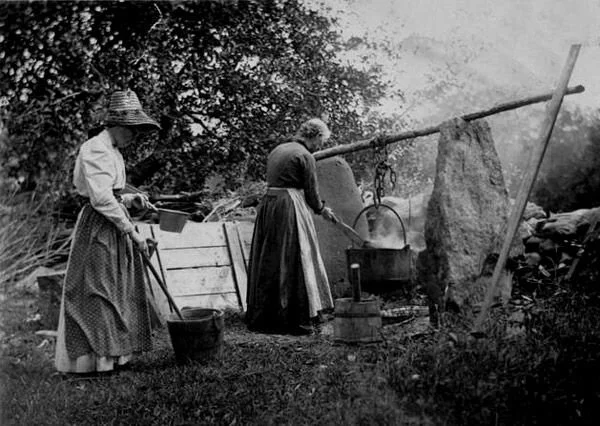The Soap Kettle
"His grandmother had made soap in it every spring and fall,--enough to last for a half-year. His mother with her lessening activities had dispensed with it, letting the men take it for hog-feed and chicken-mash. His wife had planted flowers in it,--typical of the way they had grown to look at life,--flower, no work, but plenty of income. Flowers over all the harsh facts of life. Flowers in the soap-kettle, and--a complacent feeling that the soap would arrive some way. Well, the flowers in the soap-kettle were dead and rotted now. So were all the fancy notions of life."
I read this quote from "Spring Came on Forever" by Bess Streeter Aldrich a year ago and it has stuck with me ever since. The book covers the lives of several generations of families beginning with the first generation to homestead on the lonely Nebraska prairie. This particular quote does a good job summarizing the book's premise that with each passing generation traditions and skills are lost. My pioneer ancestors, like the characters in this book, probably made their own soap, along with butter, bread, cheese, and a number of food items we buy from the grocery store today. I grew up in the generation that puts flowers in the soap kettle, making a useful item a decoration. But recently I've reevaluated my life and realize just how much I'm missing out on by not knowing how to do any of the things my ancestors did. I would rather be the grandmother who made soap in the kettle every spring and fall, not the wife planting flowers in it.
Part of the reason I would rather be making the soap instead of planting flowers is nostalgia for the past, something I've had embedded in my DNA for as long as I can remember. I've always been fascinated with old things, places, and stories. I was the kid actually interested in our 3rd grade assignment to find out our ancestry instead of just getting the assignment done. As an adult I have begun to dig further into my heritage and find the truth about my ancestors. But more than the connection to the past, I know that my great grandparents lived a much more sustainable life that me. They spent time making their own goods if possible. Don't get me wrong, I understand the convenience and time savings of buying a bar of soap from the store instead of spending a day twice a year making it. Not everyone has the time to devote to such endeavors. But there are many goods we could make at home with a little extra effort instead of buying at the store. I've spent several Saturday's this summer canning my own pasta sauce, tomatoes, and pickles to avoid buying them at the store and have had mild success at making my own mozzarella cheese. It takes me a full day to make a loaf of bread, but I use my own natural yeast instead of buying it from the store. All these homemade goods result in less waste and a better tasting product.
My great grandparents were from a generation raised to fix or mend broken or worn items instead of throwing them away. They purchased durable goods, not single use items or cheaply made products. The amount we throw out because we do not know how to fix it is alarming. Our landfills are filling up with all the junk we toss. I am guilty of once having a throw it out mentality and thought my grandmother was crazy for taking her vacuum in to be refurbished. I thought, just throw it out and get a new one. Now when items in my home are no longer useful to me I place it on the Buy Nothing Facebook page for someone else to use. Going a step further, I try to acquire less so I wont need to get rid of as much. Anything I buy new goes through a days long process of research to determine if I can find it second hand and if not, the next most sustainable option. I could have bought some new shirts on Amazon weeks ago, but I'm waiting to go to the thrift shop up the street to see if I can find what I need there instead.
I lament the loss of the milk man, a service discontinued far before my generation. What I wouldn't give to have someone drop off fresh milk at my front door every week. The unpasteurized product would help with making better mozzarella cheese too. The dry goods store is also a relic of the past I would not mind having back. The zero waste shop up the street, Exist Green, is actually very similar to an old dry goods store. Places like the zero waste shop demonstrate how we are slowly returning to a society more like the one my great grandparents might recognize. One where we walk to the corner store, interact with the owner, and do a few more things ourselves. I try to be more sustainable and self-sufficient and have learned a lot since I began this journey nearly a year ago. I have learned to make bread from my own wild yeast, homemade pasta, cheese, herbs, deodorant, and compost in my backyard. My next challenge is to learn how to sew well enough to mend outfits, fix holes, and maybe even make my own clothing, yet another skill we have forgotten how to do since the department store replaced the need.
I feel like we are going are starting to reverse Aldrich's story. My generation started as the ones putting flowers in the kettle, but we're working our way back to the ones who use the kettle to make our own soap. We are learning how to do more ourselves, use less resources, and become a more sustainable generation.







